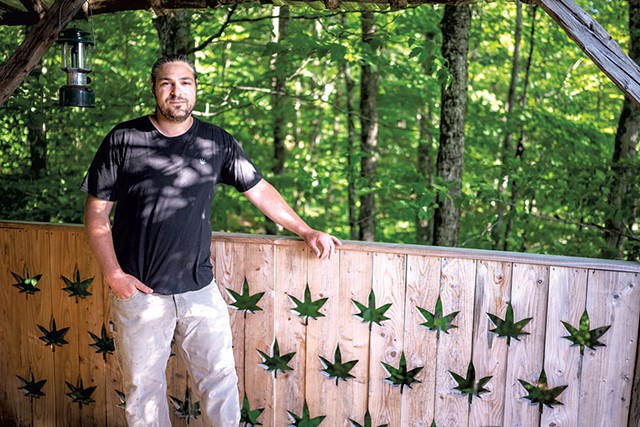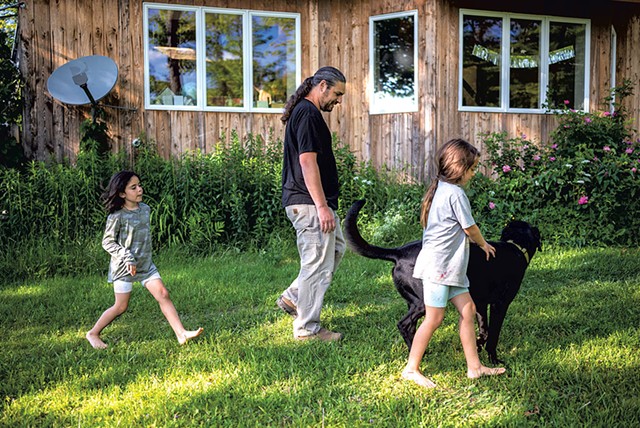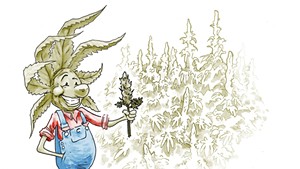
- Josh Kuckens
- Dan Pomerantz
Dan Pomerantz seemed tense. He was eager to show a reporter around his 200-acre farm in Craftsbury and explain his plans for creating a world-class cannabis breeding and cultivating facility in the Northeast Kingdom.
But Pomerantz was also awaiting an important phone call and needed good cellphone service, which is spotty on his sprawling mountainside farm. That afternoon, the Vermont Cannabis Control Board was due to issue two rulings on his application to become a licensed cultivator. One would decide whether his three adjacent properties constitute one location. The other would determine whether Pomerantz qualifies as a "social equity applicant."
By law, the CCB can award this preferential status to applicants who are Black or Hispanic, who come from communities disproportionately affected by cannabis prohibition, or who were once incarcerated on pot-related offenses. In 2012, Pomerantz was convicted of felony marijuana possession in Nevada and served a day in jail. Were he to qualify, the CCB would waive his $19,500 application and licensing fees.
"I'm just trying to do something that is bettering the people around me, bettering the environment and bettering my community," Pomerantz said as he anxiously awaited the call from his attorney.
If Pomerantz got licensed, it would fulfill his lifelong dream: to grow high-quality cannabis legally in Vermont. For about a decade, the 40-year-old Massachusetts native grew and sold black-market herb in the NEK before moving to northern California's Humboldt County to hone his pot-growing skills.
There, in the fabled Emerald Triangle, the geographic and cultural epicenter of the global cannabis industry, Pomerantz earned a reputation for breeding and cultivating award-winning strains. As CEO and founder of the cannabusiness Rebel Grown, he partnered with licensed nurseries to provide seeds, clones and other cannabis products to dispensaries that cater to medical patients and to those that sell to connoisseur California consumers in Beverly Hills, Pasadena, Eagle Rock and other cities.
"My flower doesn't need to be in 500 stores and make $30 million a year," Pomerantz said. "It just needs to be on the top shelf of some of the best ones."
Having made a name for himself in the highly competitive West Coast weed market, Pomerantz bought the Craftsbury farm 10 years ago — on the very land where he once ran a black-market grow operation. He now wants to use his vast stock of rare and exotic varieties, including more than 200 genetic strains he developed himself, to create the most intensive cannabis breeding program on the East Coast.
But rather than be fiercely proprietary about his intellectual property, Pomerantz espouses a communal ethos he learned from Humboldt County's legacy, or what he calls "traditional" pot growers: He wants to share the genetics he's spent years perfecting with fellow cultivators and hobbyist growers.
In short, he wants to bring his best California kind bud home to the Green Mountain State.
"I love Humboldt County and my farm in Palo Verde," he said, "but I've always felt the most at peace and the most happy in Vermont."
While he awaited news from the CCB, Pomerantz gave a tour of his property, where he lives with his partner of 17 years and their two young daughters. His pickup truck slowly climbed a rutted dirt road that led to a mountaintop cabin, which offers a spectacular, 360-degree view of the Green Mountains and the nearby Lowell Mountain wind turbines. There, Pomerantz spoke affectionately about his first love — cannabis — in terms reminiscent of a wine aficionado, making references to Humboldt County's appellation and terroir.
Among industry insiders and cannabis connoisseurs, Pomerantz is perhaps best known for a strain he developed called Double OG Chem, which has won numerous international awards, including the prestigious Breeder's Cup of the Emerald Cannabis Cup competition — twice. Four of the top 10 winners in this year's Emerald competition, known as the Golden Globes of cannabis, were strains he developed. In May, when actor and weed enthusiast Woody Harrelson opened a dispensary in West Hollywood, his handpicked selection of cannabis flower included Rebel Grown's Double OG Chem.
When asked to describe strains he has preferred to cultivate in recent years, Pomerantz switched to weed-nerd lingo, leaving me glassy-eyed even before I'd sampled his products.
"A lot of people know me for my gassy stuff," he said, referring to strains with a gasoline-like aroma; other strains smell skunky or earthy. His gassy strains include "Chemdog, Sour Diesel, and OG Kush-dominant lines that have a lot of beta-caryophyllene and myrcene-dominant terpenes," he said.
Pomerantz's knowledge of cannabis breeding, cultivating and soil science is all the more impressive given that he has no formal education in agronomy, botany or genetics. Pomerantz barely finished high school and never attended college. He credits his success in the industry to a combination of passion, perseverance and being in the right place at the right time.
From Outlaw to Expert
Pomerantz's interest in plants was kindled in elementary school in his hometown of Newton, Mass. When his class did a project on monarch butterflies, he was fascinated by the fact that each butterfly species has its own host plant. By age 13, Pomerantz was smoking pot, and his botanical curiosity glommed on to cannabis. He'd go to libraries and bookstores to read whatever he could find on the taboo plant.
Much of his early interest was financially motivated; he didn't like paying for weed and wanted to grow his own. Also, he didn't like not knowing what he was smoking: Where did it come from? Was it tainted? What chemicals were used to grow it?
Being a teenage stoner created major family conflicts, Pomerantz recalled, especially with his father, a social worker who specialized in adolescent substance abuse and who had a 1950s-era abhorrence for marijuana. By 17, Pomerantz had been kicked out of several high schools, so his parents sent him to rehab. He was arrested seven times before he turned 20 — though never, Pomerantz emphasized, on a drug offense. Mostly, he said, it was a consequence of "hanging out with shady people ... and doing Boston wannabe-tough-kid stuff."
Fortuitously, Pomerantz found an open door that led him to Vermont. The mother of a friend owned a gorgeous, 100-acre property in Stowe. One day she told Pomerantz that if he could stop getting arrested and graduate from high school, he could come live with them in Vermont.
He did. In June 2000, Pomerantz skipped his commencement ceremony and moved to Stowe. From the day he arrived, he began dreaming of owning a house and property just like it. But at the time, he said, "Those things seemed pretty unobtainable for me."
Pomerantz's love of the sticky green stuff hadn't waned, and soon he was looking for experienced growers in Vermont to mentor him. It was a near-impossible task because most flew under the radar.
"It was sort of like a head shop. You couldn't say the word 'bong,' or they'd ask you to leave," he recalled. "With growing, it was the same thing."
Eventually, Pomerantz met some Phish fans who grew weed and shared their know-how. His skills improved, and in 2003 he took over a grow house in Wolcott, then started renting apartments with outdoor gardens and indoor grow rooms. By necessity, he also became stealthy.
"I lived like a ghost," Pomerantz said. "My friends in Vermont all thought that I lived in Massachusetts. I'd go grocery shopping several towns over. I had a story about what I did for a living, as a mortgage broker working from home. I had to lie to every landlord I ever had and moved every six to nine months."
In August 2009, Pomerantz made his first trip to northern California to work on a pot farm, mixing and mending soils and rebuilding gardens. He returned the following fall to help bring in the harvest and trim plants. By March 2010, he was living there full time.
"I didn't want to move to California until I was good enough," Pomerantz said. "Knowing how competitive it was, I didn't want to be just another opportunist. I wanted to bring something to the table."
By sheer luck, Pomerantz ended up in a southern Humboldt County neighborhood that was home to many of California's legendary pot farms that had sprung up in the late 1960s and early '70s. His boss — whose identity Pomerantz still protects years later — was a traditional grower who'd been cultivating weed for decades before it was legal and was getting burned out. When he noticed Pomerantz's enthusiasm for doing his own seed selection, documenting his genetics on online forums and sharing his knowledge with other growers, he offered Pomerantz a greenhouse to develop his own strains. Soon, Pomerantz was managing the owner's million-dollar medical marijuana operation.
"All of a sudden I'm working with one of the biggest growers in northern California," Pomerantz recalled. "It was like a fairy tale. It's a magical place. You're up in the mountains, the scenery is beautiful, and the people who settled there were so connected to nature and spirituality."
In his first year running the farm, Pomerantz harvested more than 1,000 pounds for medical dispensaries throughout California, doing everything from plant genetics to soil improvements to readying product for market.
"I'm a connoisseur. I'm not trying to grow a thousand pounds of something that isn't good," he said. "I want every single gram to be something good enough to be in my jar."
By the time Pomerantz left the farm, he'd developed 36 unique strains. He took with him plant clones of all of them, as well as seeds from the owner's crops to preserve their genetics. In 2011 he leased a 200-acre farm and launched his cannabusiness, Ganga Rebel Seeds Collective, which he rebranded in 2015 as Rebel Grown.
Fulfilling a Dream

- Josh Kuckens
- Dan Pomerantz with his daughters, Maya and Leya, and dog, Charlie
On his farm, Pomerantz would grow hundreds of plants of each strain just to see the full spectrum of plant characteristics. His goal, he said, was not just to wow consumers and fellow breeders but to learn.
Among his early successes was a strain called OG Chem, a genetic predecessor to his celebrated Double OG Chem, which, Pomerantz said, produced a "very marketable plant [and] really amazing herb." He shared it with Kevin Jodrey, owner of Wonderland Nursery, the first licensed cannabis nursery in the U.S.
Jodrey is a renowned international cannabis consultant. A cultivator with decades of experience, he helped Israel and Australia set up their first medical marijuana dispensaries. He's been featured in the New York Times and the Washington Post and consulted on cannabis-themed television shows for National Geographic and A&E. The Ganjier, a cannabis sommelier training program he cofounded, was featured in June on NBC's "Today" show.
Speaking by phone from his home in Miranda, Calif., Jodrey said he quickly recognized Pomerantz's talents and was among the first to carry his products. Jodrey enjoys working with Pomerantz, he explained, not just because he's a skilled breeder and a "gene freak like me" who produces reliably high-quality plants. Pomerantz, he said, values the old-school collaborative spirit once common in the Emerald Triangle that is rapidly disappearing in today's multibillion-dollar corporate cannabis industry.
"Dan's always wanted people around him to do well, and you could tell because he would always share his material," Jodrey said. "There's no shortage of smart people in the industry, but there's a shortage of good people. So, when you get someone who's smart and good, it makes it fun because you can do some cool projects together.
"I'm just stoked that he's in New England putting the work in there," Jodrey added, "because he did a wonderful job out here in Humboldt County."
Pomerantz also attracted the attention of cannabis industry publications. Julie Chiariello is co-owner and editor in chief of Skunk magazine, a cannabis quarterly founded in 2003 that's distributed to 4,000 retailers throughout North America, including Barnes & Noble bookstores.
As the industry's only publication devoted exclusively to organic and sustainable cultivation, Chiariello said, Skunk quickly took notice of Pomerantz's work. He's been growing using organic and sustainable methods since he was a teen and has spent a lot of time repairing the soil on the farms where he grows.
After years of writing about his products, Chiariello offered Pomerantz his own column, "The Breeder Diaries," in which he regularly reviews other growers' strains in depth.
Chiariello said she knew that Pomerantz would eventually return to New England.
"While he was building who he was and what he was doing on the West Coast," she said, "his heart was always dreaming of what he could ... develop in Vermont."
As Pomerantz ended our tour of his Craftsbury farm, his cellphone rang. It was his attorney, reporting that the CCB had agreed to consider his three properties as one farm for licensing purposes.
However, there was bad news, too. The CCB denied Pomerantz's social equity application. According to executive director Brynn Hare, his jail time occurred pretrial and wasn't sufficient to meet statutory requirements. Pomerantz plans to appeal the ruling.
Dejected, Pomerantz drove us to his pond, where we talked more about his long-term plans. He wants to set up a cannabis nursery and retail shop where he can sell seeds, clones and other cannabis products, as well as teach organic and sustainable cultivation practices to home growers and other licensed cultivators.
And, given his strong spiritual attachment to the plant, Pomerantz envisions creating a "cannabis sanctuary" where visitors can try his products, then hike in the woods, meditate, do yoga or rent a cabin for the night.
Pomerantz's journey from outlaw grower to respected industry expert was a long and sometimes painful one. But he believes in the rejuvenating power of cannabis for people and the land.
Ultimately, cannabis helped heal his relationship with his father, too. In 2003, when Pomerantz was 20, his mother died; later that year, his father was diagnosed with Parkinson's disease. A decade later, when Pomerantz was growing for California's medical marijuana patients, he finally convinced his father to try some to relieve his Parkinson's symptoms. He did. Today, he has a photo of his dad, who's still alive, standing in front of a huge pot plant. After years of father and son butting heads, it was a redemption, of sorts, in the form of a flower bud.
"When you've found something special, and other people recognize that," Pomerantz said, "it's like sharing a piece of your soul."










Comments
Comments are closed.
From 2014-2020, Seven Days allowed readers to comment on all stories posted on our website. While we've appreciated the suggestions and insights, right now Seven Days is prioritizing our core mission — producing high-quality, responsible local journalism — over moderating online debates between readers.
To criticize, correct or praise our reporting, please send us a letter to the editor or send us a tip. We’ll check it out and report the results.
Online comments may return when we have better tech tools for managing them. Thanks for reading.